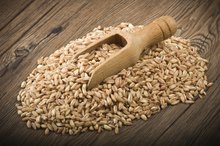What does fact checked mean?
At Healthfully, we strive to deliver objective content that is accurate and up-to-date. Our team periodically reviews articles in order to ensure content quality. The sources cited below consist of evidence from peer-reviewed journals, prominent medical organizations, academic associations, and government data.
- Nutrition Reviews: Cholesterol-Lowering Effects of Oat β-Glucan
- Nutrition Reviews: Cholesterol-Lowering Effects of Oat β-Glucan
- U.S. Food and Drug Administration: Guidance for Industry: A Food Labeling Guide
- American Heart Association: Know Your Fats
- Centers for Disease Control and Prevention: Cholesterol: What You Can Do
The information contained on this site is for informational purposes only, and should not be used as a substitute for the advice of a professional health care provider. Please check with the appropriate physician regarding health questions and concerns. Although we strive to deliver accurate and up-to-date information, no guarantee to that effect is made.
Will Oatmeal Cookies Help Lower Cholesterol?
If you're trying to reduce cholesterol and have your cookie too, oatmeal may be a slightly superior choice to other flavors. Just because the cookies contain one healthy ingredient, however, does not make them health food -- and choosing the wrong kind may do more harm than good. For your heart's sake, make your cookies at home using sensible ingredient substitutions, and stick to just one cookie.
Heart-Healthy Oats
Oats contain a type of soluble fiber called beta-glucan, which is shown to reduce artery-clogging LDL cholesterol. For this reason, the U.S. Food and Drug Administration allows food makers to claim that certain oat products may help prevent heart disease. However, only low-fat foods are allowed to make this claim -- and cookies usually don't qualify. In addition, it's unlikely that the amount of oatmeal in your cookie will produce a significant cholesterol-lowering effect.
- Oats contain a type of soluble fiber called beta-glucan, which is shown to reduce artery-clogging LDL cholesterol.
- For this reason, the U.S. Food and Drug Administration allows food makers to claim that certain oat products may help prevent heart disease.
Cholesterol-Spiking Fats
Butter Substitutes to Improve Cholesterol
Learn More
Traditional oatmeal cookies are made with butter, which is high in saturated fat 2. Saturated fat is linked to high cholesterol levels and may outweigh any heart-healthy benefit from the oats. Some commercially baked goods also contain trans fat from partially hydrogenated oil, which also increases LDL cholesterol. At the store, look out for these ingredients and check for saturated fat and trans fat on the nutrition-facts label. Saturated fats should make up no more than 7 percent of your total daily calories, while you should get as little trans fat as possible, according to the American Heart Association 3.
Alternative Ideas
At home, you have the option of omitting cholesterol-raising ingredients and substituting healthier options. Instead of butter, for example, you may use canola oil, which contains unsaturated fats that are linked to lower cholesterol levels. Even better, use applesauce in place of butter or oil. Applesauce has fewer calories and contains cholesterol-reducing soluble fiber. In addition, use egg whites instead of whole eggs, as the yolks contain saturated fat.
- At home, you have the option of omitting cholesterol-raising ingredients and substituting healthier options.
- Instead of butter, for example, you may use canola oil, which contains unsaturated fats that are linked to lower cholesterol levels.
The Calorie Issue
Does Pasta Raise Your Cholesterol?
Learn More
The average commercially prepared oatmeal cookie contains 80 to 110 calories, depending on the size. Adding those calories to your normal diet can easily lead to weight gain -- and being overweight is associated with higher cholesterol levels. Eat oatmeal cookies sparingly and as part of a balanced diet that includes mainly natural, unprocessed foods in sensible portions 2. These include fruits, vegetables, whole grains such as brown rice and quinoa and lean proteins such as beans and fish. This diet will help you maintain a healthy weight and successfully reduce cholesterol.
- The average commercially prepared oatmeal cookie contains 80 to 110 calories, depending on the size.
- Adding those calories to your normal diet can easily lead to weight gain -- and being overweight is associated with higher cholesterol levels.
Related Articles
References
- Nutrition Reviews: Cholesterol-Lowering Effects of Oat β-Glucan
- Epicurious: Oatmeal Cookies
- American Heart Association: Know Your Fats
- USDA National Nutrient Database: Cookies, Oatmeal
- Njike VY, Smith TM, Shuval O, et al. Snack food, satiety, and weight. Adv Nutr. 2016;7(5):866-78. doi:10.3945/an.115.009340
- Khan TA, Sievenpiper JL. Controversies about sugars: Results from systematic reviews and meta-analyses on obesity, cardiometabolic disease and diabetes. Eur J Nutr. 2016;55(Suppl 2):25-43. doi:10.1007/s00394-016-1345-3
- Potter M, Vlassopoulos A, Lehmann U. Snacking recommendations worldwide: A scoping review. Adv Nutr. 2018;9(2):86-98. doi:10.1093/advances/nmx003
- Rebello CJ, O'Neil CE, Greenway FL. Dietary fiber and satiety: The effects of oats on satiety. Nutr Rev. 2016;74(2):131-47. doi:10.1093/nutrit/nuv063
Writer Bio
Nina K. is a Los Angeles-based journalist who has been published by USAToday.com, Fitday.com, Healthy Living Magazine, Organic Authority and numerous other print and web publications. She has a philosophy degree from the University of Colorado and a journalism certificate from UCLA.









